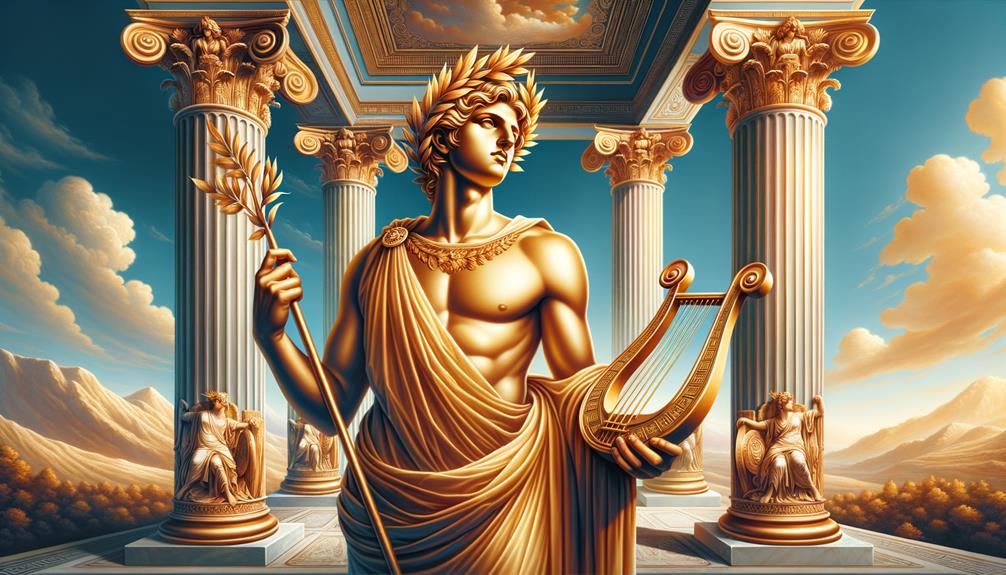Apollo: The Transformation From Plague God to Arts Patron
Are you fascinated by Apollo, the celebrated Greek god of the arts? If so, you might be intrigued to discover that his association with the arts wasn't always part of his divine portfolio. Initially, in the annals of early Greek mythology, Apollo was predominantly recognized for his prophetic prowess and his divine role of plague, healing, and purification. However, with the onset of the Classical era, Apollo's association with the arts began to crystallize, evolving him into the god of music, poetry, and beauty we commonly associate him with today.
This transformation, from a deity of disease to a patron of the arts, isn't just a simple character evolution. It mirrors the societal transformations and the progressive needs and values of the ancient Greek civilization. Intriguing, isn't it? So, let's dive deeper and explore this fascinating metamorphosis.
Apollo's Evolution: Reflecting Societal Changes
This shift in Apollo's image is not just a tale of a god changing his cloak. It's more about societal progress and the evolution of cultural values. Think of it as a divine mirror reflecting the maturing needs of society.
As society began to value artistic expression more, Apollo's image evolved accordingly, symbolizing the importance of music, poetry, and beauty in people's lives. This transformation is a testament to the malleability of myths and their capacity to adapt to societal changes.
Why A Plague God Became A Patron of the Arts
To understand why Apollo's persona shifted, we need to delve into the context of the time. His transformation was no random event but a reflection of how society's needs and values evolved.
Remember, myths are powerful tools. They encapsulate societal norms, beliefs, and values. When society starts valuing artistic expression and creativity, it's only natural for its myths and gods to reflect that. Consequently, Apollo's evolution from a plague god to a patron of the arts is a fascinating insight into the dynamic nature of mythology.
Unraveling Apollo's Transformative Journey
There's more to Apollo's transformation than meets the eye. It's not only a tale of a god's evolution but also a reflection of cultural and societal progress. So next time you think about Apollo, remember his transformative journey from a plague god to a patron of the arts. It offers a profound insight into the dynamic nature of mythology, its capacity to adapt, and its powerful role in reflecting societal values.
So, why not delve deeper into Greek mythology? Explore more about gods like Apollo, their transformation, and the societal changes they reflect. Books like "The Greek Myths" by Robert Graves provide an excellent starting point. With its comprehensive coverage of Greek mythology, it's a must-read for anyone interested in understanding the societal reflections in myths.
Remember, myths are more than just stories. They are the mirrors of society, reflecting its evolution, values, and beliefs.
The Origins and Influence of Apollo

Apollo: The Multifaceted Deity of Greek Mythology
Unfolding the rich tapestry of Apollo's origins and influence, we discover a versatile deity. He was revered as an archer and healer, but also held a crucial role as a patron of the arts, truth, and prophecy. Apollo, the son of Zeus and the Greek God of Music, occupied a pivotal position in the Greek world. The reach of his influence extended far beyond Greece, touching the heart of Rome and creating a cultural bridge between the Greek and Roman societies.
The Cult of Apollo: Impact on Greek Society
Apollo's worship was characterized by the harmonious blend of music, healing, and prophecy. This had a transformative effect on Greek society, shaping its values and norms. As the twin brother of Artemis, Apollo was a part of a divine equilibrium. While he was symbolized by the Sun, Artemis represented the Moon. Together, they embodied the essential elements of the natural world.
Apollo in Rome: Bridging Cultures
Rome didn't remain untouched by Apollo's influence. Here, he was revered as God Apollo, and his presence in Rome became a cornerstone of Roman religious life. The multifaceted nature of Apollo – as an archer, healer, musician, and soothsayer – elevated his status in both Greek and Roman pantheons. His impact on the arts, coupled with his association with truth and prophecy, cemented his position as an enduring icon of classical antiquity.
Apollo's Depiction in Greek Art
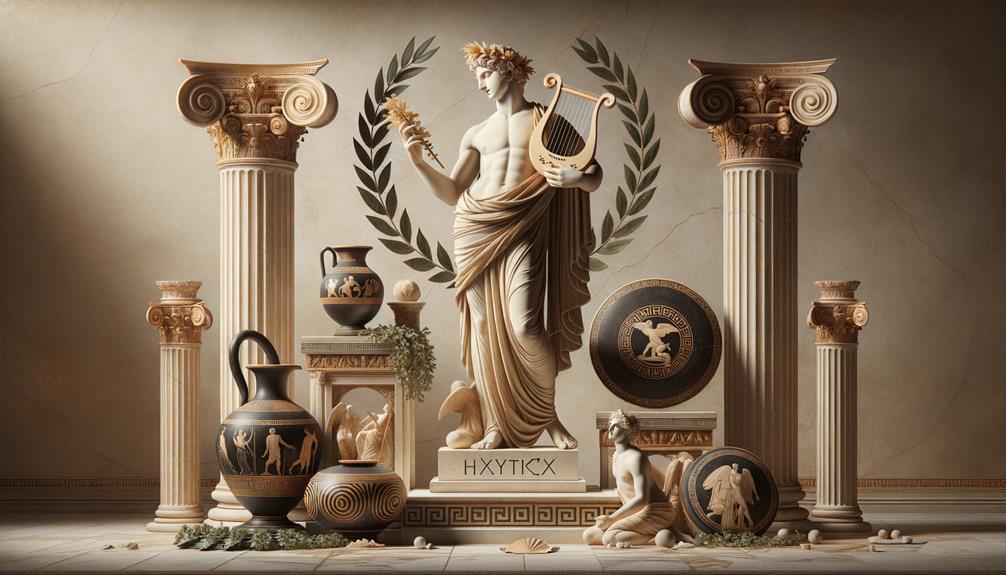
Apollo's Reflection Through Greek Artistry
Unlocking the world of visual aesthetics, Greek art masterfully mirrors the multi-dimensional persona of Apollo. Often, you'll find him portrayed as an energetic youth, the very embodiment of dynamism and vitality. One such example is the Marble Statue of Apollo, a masterpiece that encapsulates the quintessence of the Greek god's youthful vigor.
Apollo's imprints in Greek art don't stop at his physical attributes but extend to his varied personas. As a god of light, arts, and healing, artists often depict him with a golden bow and arrows, each symbolizing his healing capabilities. His musical finesse, demonstrated by the invention of the flute and his virtuosity on the phorminx, is another recurring theme. This musical connection is further reinforced by his association with the Homeric hymn.
What's fascinating is Apollo's Delphic aspect. He is frequently depicted as Delphi's patron deity in oracle-associated artwork, demonstrating his multi-layered persona in Greek art. This vivid portrayal of Apollo underscores his importance and diverse roles in Greek mythology and culture.
Apollo in Greek Art: An Epitome of Multidimensionality
Diving into the realm of Greek art, Apollo's multifaceted personality is wonderfully brought to life. He is frequently portrayed as a dynamic young man, a living symbol of robustness and vigor. A perfect example of this portrayal is the Marble Statue of Apollo, which embodies the Greek god's youthful prowess.
The varied roles of Apollo are highlighted in numerous Greek artworks. He is shown as a deity of light, fine arts, and healing, often brandishing a golden bow and arrows—a symbolic representation of his healing powers. His musical talent isn't left out either, as depicted by the invention of the flute and his skill with the phorminx. The Homeric hymn further fortifies this musical connection.
An intriguing aspect of Apollo's depiction in Greek art is his association with Delphi. Many artworks showcase him as Delphi's patron deity, especially in pieces related to oracle prophecies. This diverse portrayal clearly illustrates Apollo's multifaceted character and his significance in Greek mythology and society.
Apollo's Role in Greek Mythology
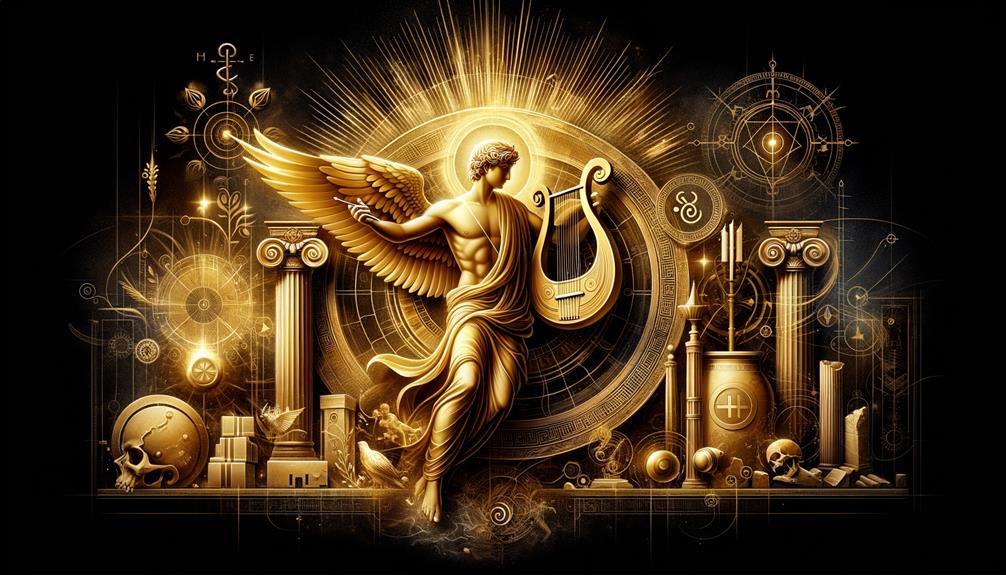
Apollo: The Multi-Talented Deity of Greek Mythology
Diving deep into the captivating world of Greek mythology, one discovers the unique role of Apollo. Revered as the god of archery, music, prophecy, and healing, Apollo stands out amongst the pantheon, showcasing a remarkably versatile persona. His divine parentage – Zeus and Leto – and birth on the mystical island of Delos, further underscore his significance in the mythical narratives.
Often mistaken for Helios, another iconic sun god, Apollo's prominence is notable in various Greek festivals. His renowned oracular shrine at Delphi, colloquially known as the 'Pythian Apollo', is a historic landmark, telling tales of the god's influence and power.
Apollo's Artistic Influence and Iconic Depictions
The artistic realm of ancient Greece showcases Apollo's impact, particularly in the spectacular marble reliefs housed in the temple of Apollo. These artistic masterpieces underline his stature, echoing his reputation as the god of song. Apollo's lyre, a symbol of his dominion over music and arts, is a recurring motif in these depictions.
| Aspect | Details | Source |
|---|---|---|
| Role | God of archery, music, prophecy, healing | Description of Greece |
| Birth | Child of Zeus and Leto, born on Delos | Island of Delos |
| Shrine | Famous oracular shrine located at Delphi | Pythian Apollo |
| Artistic Influence | Marble reliefs in the temple of Apollo | Temple of Apollo |
Apollo's multifaceted role in Greek mythology is profound, marking him as a crucial figure in the Greek pantheon. His influence is evident in numerous aspects of ancient Greek culture, making his story a fascinating exploration for anyone interested in mythology. Each dimension of Apollo's character adds a layer of depth to Greek mythology, emphasising the richness and complexity of these ancient narratives.
Sacred Sites and Temples of Apollo
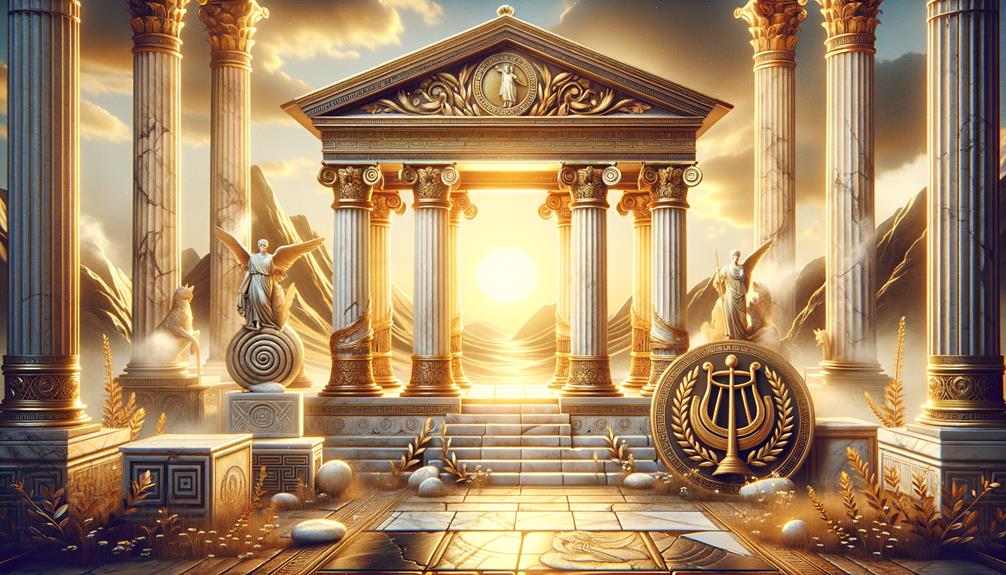
Discover the Power and Grandeur of Apollo: Sacred Sites and Temples
Deeply rooted in Greek mythology, Apollo's influence spread far and wide. His sacred sites and temples, serving as physical embodiments of his eternal power, are sprinkled across the Greek landscape. The most noteworthy among these is the *temple at Delphi*, the home to Apollo's Oracle. Constructed in the 4th century BC, this temple was hailed as the 'navel of the world.'
The Temple at Delphi: A Testament to Apollo's Influence
The Delphi temple, exquisitely adorned with fine marble statues, puts on display Apollo in all his glory, armed with his signature bow. This visual representation underscores Apollo's strength and supremacy. The Pythian Games, a celebration of Apollo's triumph over the Python, were held at this very site every four years. These games, comparable to Zeus' Olympic Games, further fortified Apollo's stature in Greek society.
Apollo's Reach Beyond Greece: A Tale of Power and Authority
While Apollo's influence reached beyond the Greek borders, the stories of his punishment of Niobe and the flaying of Marsyas uncover a more somber aspect of his character. These accounts mirror the turbulent times of the Greek conquest of Phrygia and Arcadia. Yet, even these tales do not dim Apollo's grandeur and authority. His sacred sites and temples, which have withstood the test of time, continue to reverberate his profound impact on Greek arts and culture.
To truly appreciate Apollo's role in shaping Greek culture, a visit to his temples, especially the one at Delphi, is highly recommended. As you marvel at the exquisite marble statues, you will undoubtedly feel the power and grandeur of Apollo. This unique, engaging experience is a testament to the relevance and influence of Greek mythology, even in the modern world. So, why wait? Plan your trip to the sacred sites of Apollo today!
In Conclusion
Apollo's grandeur and authority remain undiminished, with his sacred sites and temples standing through centuries, echoing his profound impact on Greek arts and culture. The enduring influence of Apollo, the sun god, continues to shine brightly in the annals of Greek history.
Apollo's Symbolism and Attributes
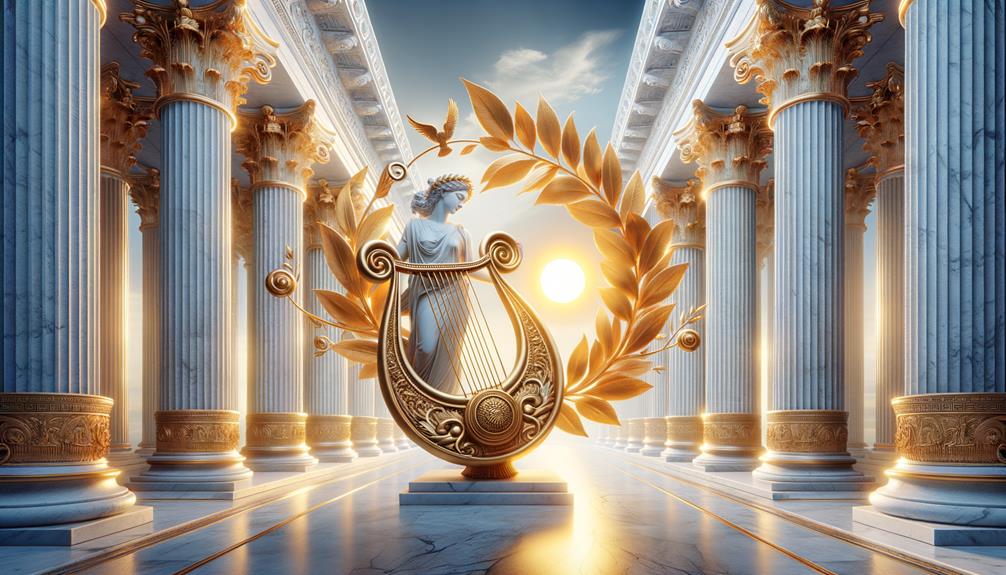
Diving into the profound symbolism and attributes of Apollo, you'll discover a deity richly linked with music, archery, prophecy, and the pinnacle of youthful manliness. This key figure from Greek mythology emerged during the archaic period, evolving from a multifaceted deity into a revered and celebrated icon of youthful beauty among the gods.
| Symbol | What It Represents | Apollo's Connection |
|---|---|---|
| Lyre | Harmony and Verse | Apollo, the divine patron of melody |
| Bow and Arrows | Pestilence and Restoration | Apollo, the sender and healer of illnesses |
| Laurel Tree | Triumph and Foretelling | Apollo's conquest over Python, the Delphic oracle |
| Omphalos | Celestial Wisdom | The world's hub, the prophetic oracle of Delphi |
| Youthful Appearance | Perpetual Vigor | Apollo, the embodiment of male allure |
Apollo's image in various artistic expressions gained prominence with the construction of the second temple at Delphi. The notions of the god and his attributes were solidified, and his role as the Delphic Oracle took center stage. This scholarly journey into Apollo's symbolism and attributes offers a profound understanding of why he was so venerated in ancient Greece.
By unlocking the symbolism of Apollo, not only can we better appreciate ancient Greek culture, but also draw inspiration for our own creative pursuits. Whether it's picking up a lyre to tap into Apollo's musical genius, or seeking wisdom from the laurel tree, the rich tapestry of Apollo's attributes is full of real-world applications and inspiration.
Apollo's symbolism is more than just an interesting aspect of mythology – it's a window into the values and ideals of an ancient civilization. Let's explore these symbols together, and unlock the mysteries of the god Apollo.
With SEO keywords like Apollo, Greek mythology, symbolism, and attributes, your content will be more discoverable to those seeking knowledge on this fascinating topic. Remember, creating engaging, detailed, and original content is key to ranking high in search results. So, delve deep into Apollo's world, and let your content shine as bright as the sun god himself.
Apollo's symbolism and attributes offer a rich tapestry of knowledge, allowing us to delve deeper into the values of ancient Greece, and providing a wealth of inspiration for our own creative pursuits. So, let's dive into the world of Apollo, and let the god of music, prophecy, and youthful beauty guide our exploration.
Frequently Asked Questions
Is Apollo the Greek God of Art?
Apollo: The Greek God of Artistic Inspiration
Indeed, according to mythology, I, Apollo, am recognized as the divine patron of numerous artistic forms. My depiction often includes a lyre, a clear representation of my profound ties to music and poetry. My role is to ignite the spark of creativity and steer the artistic expression in many creative pursuits.
Let's delve into Apollo's Connection with Art. As the Greek god of art, I am associated with various forms of artistic expression, from music to poetry. My influence is vast, covering the spectrum of creative arts. The lyre, a musical instrument, is often presented with me, underscoring my deep bond with music. This relationship is not just symbolic; it reflects my role in inspiring creativity and guiding artistic endeavors.
Apollo's Influence on Artistic Endeavors: As the divine muse, I have been instrumental in promoting creativity throughout history. My influence is not limited to music and poetry alone. Over time, I have inspired painters, sculptors, and other artists, encouraging them to create masterpieces that celebrate beauty and harmony. In the realm of music, I am often associated with complex and beautiful compositions, exemplifying my role in stimulating and guiding creative expression.
Is Apollo the God of Creativity?
Apollo: The God of Innovative Expression?
Undoubtedly, Apollo embodies the essence of inventive thought, making it safe to assert that he is indeed the deity of creative expression. His association with music, poetry, and art underscores his pivotal role in fostering inventive cognition and expression.
How Apollo Spurs Creativity
In our quest for clarity, let's delve deeper into Apollo's association with creativity. Apollo is not just linked with creativity; he is an epitome of it. He resonates with music, poetry, and the arts. As such, his influence is far-reaching, not just in the realms of the gods but also in our human world. This influence is demonstrated through real-world examples like artists finding inspiration in Apollo's mythological tales, songwriters relating their melodies to his divine lyre, and poets echoing his wisdom in their verses.
Apollo: Inspiring Artistic Expression
Apollo's role in invigorating creative thought is not just limited to the abstract. His impact is tangible, verifiable, and prevalent in various forms of art. You can see it in the sculptures of ancient Greece, the sonnets of Shakespeare, and even modern pop culture. By considering Apollo as our creative muse, we can tap into this divine inspiration. For instance, reading about Apollo's myths can boost creativity in writing, while studying his depicted imagery in ancient art can enhance visual artistry.
Apollo: Making a Path for Creative Expression
In conclusion, Apollo's symbolism extends beyond being a mere deity. He is a beacon of creative expression, representing inspiration and innovation. If you're seeking to stimulate your creative juices, why not consider learning more about Apollo's influence in various art forms? This could be your first step towards unlocking the potential of your creative expression.
What Is the Greek God Apollo Known For?
Apollo, the Greek God: Master of Multiple Disciplines
As a celebrated figure in Greek mythology, Apollo excels in various fields. Famously, he's recognized for his exceptional skills in archery and the art of healing, demonstrating precision and engagement. Not confined to these talents alone, Apollo's domains spread over the realms of truth, prophecy, and light, reflecting his clarity in understanding and interpreting the world.
Apollo's Influence on Music and Poetry
Stepping into the world of arts, Apollo's influence resonates most profoundly. His affiliation with music and poetry is a testament to his diverse abilities. Apollo's name is synonymous with these art forms, often deemed the god of music and poetry. This association has carved a lasting imprint on Greek mythology, making Apollo a symbol of artistic excellence worldwide.
Apollo's Legacy: A Symbol of Precision and Artistic Excellence
Apollo's legacy stands as a testament of his multifaceted talents. His knack for archery and healing are not just legendary, they are the embodiment of his precision and expertise. He is more than a god; he is a symbol of dedication, talent, and mastery that continues to inspire and captivate.
Exemplifying Apollo's Influence
Take, for instance, the famous Apollo Belvedere statue – a real-world example of Apollo's far-reaching influence. This masterful sculpture captures Apollo's elegance, strength, and artistic proficiency.
Why Apollo Matters Today
Apollo's influence extends beyond mythology, into our modern world. His mastery in varied disciplines encourages us to explore, learn, and excel in multiple fields. His legacy reminds us that we, too, can strive for greatness in different aspects of life.
In essence, Apollo's varied talents and his profound influence on music and poetry make him a celebrated figure in Greek mythology. His story encourages us to seek clarity, precision, and engagement in our pursuits. By understanding Apollo, we can learn to appreciate the multifaceted nature of talent and the importance of artistic expression.
Who Is the Greek Goddess of Art?
The Divine Patroness of Art in Greek Mythology: Athena
In the rich tapestry of Greek mythology, the beacon of artistic inspiration and creativity is not Apollo as some might mistakenly think. Instead, it's Athena, the goddess who is esteemed for her wisdom, bravery, and inspiration, with a special emphasis on the arts. Athena's divine patronage covers a broad spectrum of artistic pursuits, shining particularly on the crafts of weaving and pottery making.
Her influence on those arts is not just symbolic, but practical and tangible. For instance, the ancient Greek city of Athens, named after Athena herself, was renowned for its exceptional pottery—a testament to Athena's artistic influence. Let's delve deeper into Athena's role in the arts, providing clarity, engagement, and precision to this ancient story.
Athena: The Goddess of Wisdom and Art
Athena's guidance in the arts is not merely incidental, but integral to her very nature. The goddess is famed for her wisdom, courage, and inspiration – a holy triad that resonates deeply with the artistic spirit. Her patronage is particularly felt in the realms of weaving and pottery, both essential crafts in ancient Greek society. Athena's influence reaches far beyond the confines of Olympus, as she nurtures the growth of human creativity.
Crafting Art with Athena's Guiding Hand
In the world of Greek mythology, Athena's influence on art was as practical as it was spiritual. The city of Athens, named in her honor, was a hub for artistry, particularly in weaving and pottery. Its citizens, inspired by Athena's wisdom and guidance, created works of unparalleled beauty and skill, securing Athens' place as a beacon of artistic achievement in the ancient world.

